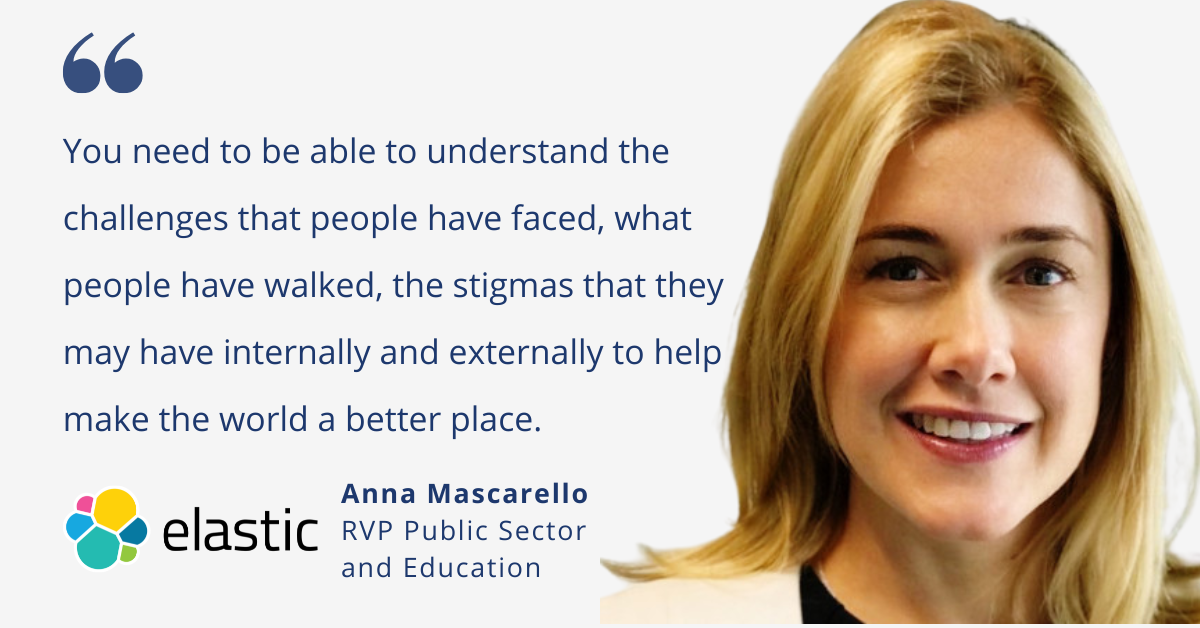As the daughter of Italian immigrants to multicultural Australia, Anna Mascarello innately knows the importance of perceiving and adapting to cultural differences, whether that’s in a meeting with foreigners or traveling to countries with her husband and two kids.
“I've never thought about intercultural communication as a concept before. For me, it’s just a way that I’ve grown up. I’ve worked with some pretty amazing people and I think it's so important to understand the person as a whole and their background in order to appreciate different perspectives.”
As the Regional Vice President of Public Sector & Education in Australia and New Zealand for Elastic, Anna leverages her background and experiences to create and lead a global team that values diversity. We sat down with Anna to hear about her professional trajectory in sales and her advice on how to improve your intercultural communication skills.
Moving Beyond the Box
“I am creative at heart, I'm a very curious person and I like to question things,” Anna says. Feeling like much of the methodologies at school were too limiting, she couldn’t think openly about the world, and many times, Anna felt like she was being forced into a box. As she moved into college, she was met with opportunities that helped her move beyond that box into a deeper understanding of others.
Anna attended a University where most of its students were from multicultural backgrounds, foreign countries, or were non-native English speakers. This experience further allowed her to understand varying cultural perspectives. Here, she pursued a degree in Business and Marketing, which opened the door to international work.
Anna was offered a year's placement in Lyon, France, where she once again found herself navigating a foreign language and culture. “The biggest challenge for me was navigating the cultural differences,” she says, which in turn, helped her develop cultural insight.
When it comes to her profession in sales, she uses her past experiences to better understand her clients. “With sales, it's really important to understand your customer or prospective customer. You really have to take the time to be in their shoes, understand them, and understand the why. I can’t think of anything more exciting,” says Anna.
The Importance of Intercultural Communication
“I'm a big believer in diversity,” says Anna. “A lot of people think diversity entails gender. But diversity is culture. It’s about different perspectives which come from different life experiences.”
Taking this into account, Anna uses her role in leadership to help create a culturally diverse team at Elastic. Within her team, she encourages each person to be confident in who they are and where they come from.
“I think it's important not just for my role, but for how we work as a community and a society. You need to be able to understand the challenges that people have faced and the way that their personal experiences have shaped their perspectives.”
Building a Diverse Team
When asked about the challenges of building a diverse team, Anna says she only sees opportunities. “I think it poses challenges when you're not understanding who people are and what their personal values are.”
As a leader, Anna wants to instill cultural diversity and acceptance from small communicative practices to institutional decisions. For example, she encourages people on her team to share their stories. She explains, “It gives you perspective. When you can share the stories of individuals, that’s how you learn.”
Anna credits Elastic for their efforts in creating a workplace that values diversity, from its leadership to the core. She feels comfortable creating a space that values kindness and openness to all. “The main thing here is that we have the opportunity to be open, to have a voice, and a forum to use it.”
5 Tips to Improve Your Intercultural Communication
Though Anna has developed most of her intercultural insight and communication growing up, she offers five tips on how to develop intercultural communication, no matter your background:
- Be welcoming. “Always be open to other cultures, no matter how different they are.”
- Be intentional about experiencing a different culture. “Travel if you can and surround yourself with people from all different upbringings and backgrounds.”
- Understand cultural challenges and history. “Understand the history and the path that others have had to pave the way to give us the opportunities we have.
- Never assume. “Take the time to learn and listen…..really listen!”
- Always be respectful and kind. "Respect and kindness improve communication between your work colleagues and promotes a positive and inclusive work culture."



